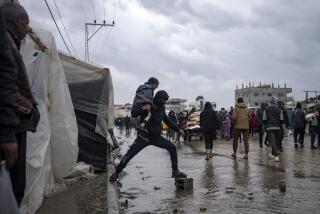Angry Victims of Earthquake Riot in Cairo
- Share via
CAIRO — Hundreds of angry earthquake victims rioted Saturday night in central Cairo, storming toward the main government television building, lighting fires and throwing rocks before security forces using tear gas drove them back into the city’s rubble-strewn alleys.
At least 70 people were arrested in the melee, which began about 10 p.m. when a rumor swept the crowded Bulaq district that it would take six months to find new apartments for those left homeless by last week’s earthquake.
Chanting “Dirty government!” and “We must have houses!” an estimated 700 people surged toward the state television building and began marching angrily through the narrow streets of Bulaq when security forces fired tear gas into the crowd.
Truckloads of riot police began chasing the crowd through the streets after dozens of young men threw large stones at police and set fire to a traffic kiosk in the main square in Bulaq, one of the most densely populated slums in the world.
“The problem is that after everyone lost his house he heard it will be three days or four days to get a new one. And now there’s a big rumor it will be not less than six months, and we will have tents, not houses--four families in each tent!” said Hassan Kamel Hussein, a concrete worker whose damaged house has been declared unfit for habitation.
“People have lost their patience,” he said. “I’m an Egyptian citizen, and I want my rights, but there’s nowhere to go. If they tell you, ‘Leave the place because it’s dangerous,’ OK. But you have to give me someplace else to live! If you tell me to leave and there is no place to go, I ask you, what can I do?”
The riot was the worst civil disturbance to erupt since Monday’s 5.9 earthquake killed at least 543 people and left thousands of families homeless in the streets, their homes either collapsed or too badly damaged to live in. Some families have abandoned their homes because they could not find an engineer to declare them safe.
Elsewhere in Cairo on Saturday, about 3,000 villagers left homeless by the quake demonstrated at a provincial headquarters, and about 1,000 people gathered near the office of Prime Minister Atef Sedki to protest the government’s slow action in housing the homeless.
“O Mubarak, son of shame, gather up your shame, gather up your children from the streets!” some of the protesters chanted, referring to Egyptian President Hosni Mubarak.
Mubarak, who estimated total damage from the quake at well above $330 million, pledged Saturday that housing would be made available to all those left homeless in the disaster.
“The government since the problem began has done everything in its power. . . . In Cairo and in Giza we have about 50,000 flats ready for the people, and we are working very hard to prepare more houses and compensation to those who lost their homes and families,” Mubarak told reporters.
Sedki said 3,500 homeless families already have been moved to vacant apartments built in the new satellite cities that surround Cairo. For years these apartments have sat uncompleted because most Cairo residents have been reluctant to abandon the central city and move to the suburbs.
“We are working as quickly as we can to make the apartments ready. But people who are living in the streets now will be moved to tents temporarily until the apartments are ready,” Sedki said. “Within three or four days, no one will be in the streets.”
Egyptian officials called in the army Saturday to help in the mammoth engineering task of determining which buildings in the city still are habitable. In the teeming Bulaq district, where Saturday’s riot erupted, hundreds of homeless complained that only two engineers had come to inspect their houses until Saturday morning, when more arrived.
A police officer at the television building said police fired tear gas at the demonstrators when there appeared to be no other way to break up the disturbance.
“These people didn’t want to talk. They wanted to fight,” he said.
More to Read
Sign up for Essential California
The most important California stories and recommendations in your inbox every morning.
You may occasionally receive promotional content from the Los Angeles Times.













